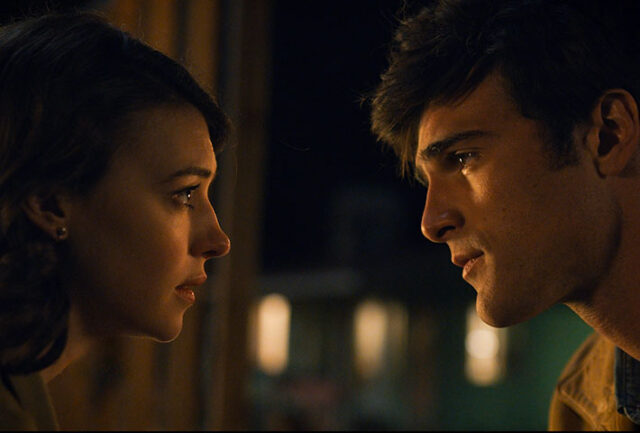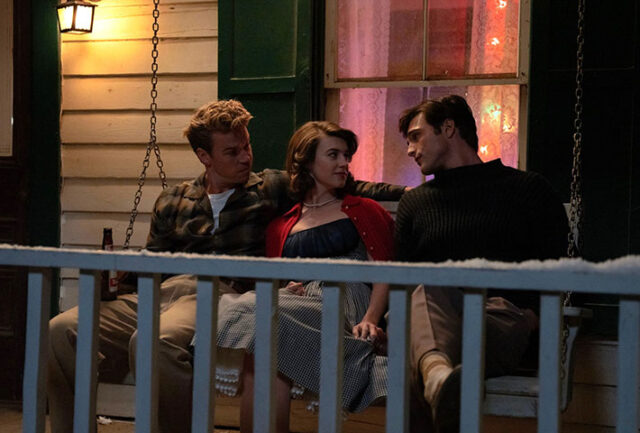Elegiac yet restrained and lyrical, Daniel Minahan’s On Swift Horses explores the lives of two lost souls trying to find their footing in 1950s America. What initially seems a forbidden tryst between the main characters, played by budding Hollywood stars Jacob Elordi and Daisy Edgar-Jones, becomes something else entirely: a quest for morality and love in a society that doesn’t recognize their authentic selves. It’s also a quest that needed more psychological depth and exposition to expand on the complexities of its characters and themes. Compared to heavy-hitters such as Carol, Boys Don’t Cry, or 1985’s brilliant and underseen Desert Hearts, which dealt with similar LGBQT+ themes, this film feels slightly diluted and slight. And yet I’m recommending it, based on its heartfelt performances, compact narrative, and beautiful cinematography and production design.
The film’s primary concern appears to be the subject of freedom, particularly in a country that lays claim to defining it. First-time film director Daniel Minahan, known mostly for his work in television (Halston, House of Cards), taps into an almost idealistic notion of unbridled liberty when we meet Julius (Jacob Elordi), a soldier returning from the Korean War with a skip in his step. With his Montgomery Clift-ish blend of brood and bravado, Julius doesn’t seem broken by the war, as he ambles down a snow-crusted road with a duffel bag slung over his shoulder and a cigarette dangling from his mouth. If anything, he’s ready to leave the past behind and start over. Visiting his brother, Lee (Will Poulter), and his brother’s fiancée, Muriel (Daisy Edgar-Jones), in their home in Kansas, Julius slips into their domesticated lives like a windblown leaf.
The first act nearly convinces us that we’re jumping into an illicit affair between Muriel and her soon-to-be brother-in-law, since they’re drawn to each other immediately. From the moment they lock eyes, they can’t stop touching each other and talking as if they’ve known each other for years. The second poor Lee leaves the room, you think, they’ll fall into each other’s arms. Thankfully, this story has more complicated subjects to explore outside the confines of a small house in Kansas and a Douglas Sirk–like melodrama. We eventually see the flirtation turn out to be a wordless, soulful connection between two lost souls, but even if this poignant “recognition” between outsiders looked good on paper, the result is simply bewildering. A little exposition would’ve gone a long way in a movie that favors style over substance.
Based on Shannon Pufahl’s novel of the same name and adapted by screenwriter Bryce Kass, the story follows Muriel and Julius as they embark on divergent paths. Minahan does a good job of balancing their parallel storylines with an assured, fluid ease. Julius is drawn to the electricity of Las Vegas, where he becomes a spotter of cheats for a casino, while Muriel and Lee relocate to San Diego and land menial jobs in hopes of saving enough money to buy a house. Individually, Muriel and Julius struggle to adapt to their new environments, and start behaving in ways that surprise even themselves. Tired of the daily grind, Muriel frequents the racetrack, where she places hefty bets before hiding the spoils from her husband, while Julius engages in a passionate affair with coworker Henry (magnificently played by Babylon’s Diego Calva) even as they’re under the scrutiny of their casino bosses. These storylines ping-pong back and forth with a brisk, absorbing tempo as we wait for the film to provide some subtext, which, sadly, never arrives.

Eventually, Muriel and her husband purchase a tract home in a gestating suburb, where she falls for their neighbor, Sandra (Sasha Calle), an intriguing woman who’s far from ashamed of her sexual orientation. Still, Muriel can’t decide if she’s in love with Sandra herself or her enviable resilience. Although nuanced, respectful, and even erotic, the film’s exploration of LGBTQ+ themes lacks a certain verve and complexity. At times, the various romantic interludes inadvertently slide into fluff and superficiality, resulting in long-winded passages where couples smoke in bed and mumble incoherently about their hopes and dreams. These scenes, which should be crucial, never expose the interiority of the characters or reveal the implications of the story. Even with its lush tonality and compact storytelling, there’s still a large chasm between the film’s intentions and the vaporous emotionality wafting off the screen.
One of the main problems with the movie is that you never really buy that these characters actually exist in its 1950s setting, a time in this country when being gay wasn’t just frowned upon but dangerous. Unlike Brokeback Mountain, in which Ang Lee drew us into a claustrophobia where the world outside posed a real threat, the protagonists in Horses don’t seem to feel particularly paranoid or reactive to their surroundings, and since we never feel complicit in the struggle between what they desire and the rules they must adhere to, the story feels more 2025 than 1955. The attainment of personal fulfillment in this kind of society comes off as a little lightweight.
Still, the movie retains an artistry that speaks to its themes more than the script does. With Luc Montpellier’s luxuriant cinematography and production designer Erin Magill’s keen eye for authenticity, Minahan creates a midcentury landscape peppered with sun-dappled glamor, bright pastels, and polished whites during the day, and thick ambers, smoky rooms, and silhouetted figures at night. The performances are all wonderful as well. Even with their underwritten parts, Daisy Edgar-Jones and Jacob Elordi plumb the depths of their predicaments. Sad sack Lee, played with aplomb by Poulter, brings more nuance and empathy than you’d expect.
And Horses is an unusual experience, which is a good thing, especially in today’s cookiecutter IP environment. Generally, the movie has a positive outlook, which is impressive for a story that enjoys simmering in gloom. But that same softness and positivity kneecaps it from being truly impactful. Dare I say this movie needed more grit and opacity when dealing with the idea of freedom and LGBTQ+ rights in this country; the result is a little mushy for the hard reality of the story and the stakes involved. The film’s protagonists are forced to live in the shadows, which is a terrible place to exist, but we never fully experience the weight of their imprisonment. Not to the extent that it deserves.
“On Swift Horses” opened in theaters nationwide April 25, 2025




